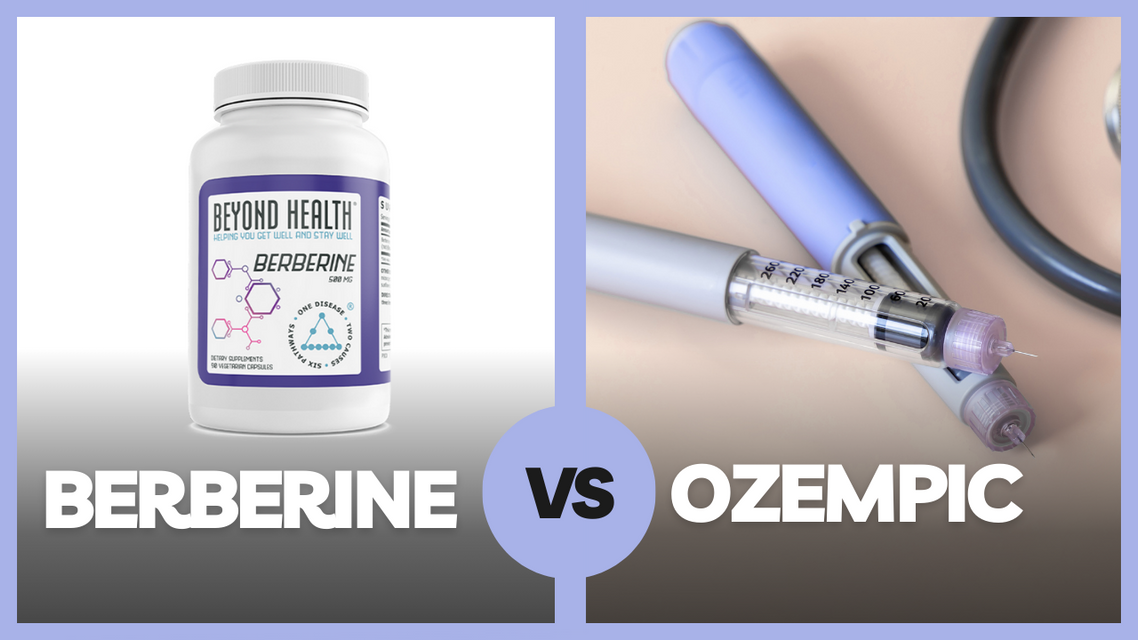Posted by Ralph Panttaja on May 10th 2024
Berberine vs. Ozempic: The Ultimate Showdown
In the realm of natural health supplements, berberine is gaining recognition. Its potential benefits, particularly for metabolic health, are drawing attention.
Berberine, a compound extracted from several plants, has been used in traditional medicine for centuries. Today, it's being hailed as nature's Ozempic, a pharmaceutical drug used for type 2 diabetes and weight loss.
This comparison stems from berberine's potential to improve blood sugar control and promote weight loss. But how does this natural compound stack up against a prescription medication?
In this article, we delve into the science behind berberine's benefits. We'll compare its effects to those of Ozempic, shedding light on why berberine is being called nature's alternative.
Whether you're a healthcare professional, a wellness enthusiast, or someone seeking natural solutions for weight loss, this analysis will provide valuable insights.
Unveiling Berberine: Nature's Answer to Metabolic Health
Berberine is a bioactive compound found in several plants, including the Berberis species. Historically, it has been a staple in traditional Chinese and Ayurvedic medicine.
In modern times, berberine is recognized for its potential to improve various metabolic health markers. It activates an enzyme called AMP-activated protein kinase (AMPK), often referred to as a metabolic master switch.
This regulation of AMPK is also a target for anti-diabetic drugs like metformin. Berberine's ability to lower blood sugar levels in individuals with type 2 diabetes has been demonstrated in studies.
Moreover, berberine may improve cholesterol levels, reducing total cholesterol and LDL ('bad' cholesterol) while increasing HDL ('good' cholesterol). This makes berberine a promising natural solution for metabolic health.
Berberine vs. Ozempic: Comparing Nature's Alternative
The comparison between berberine and Ozempic, a GLP-1 agonist prescription drug, arises from their similar effects on blood sugar control and weight loss. Ozempic is FDA-approved for the treatment of type 2 diabetes and, in some cases, for weight loss.
Unlike Ozempic, berberine is available over the counter as a dietary supplement. This accessibility, coupled with its potential benefits, makes berberine an attractive alternative for many.
However, it's crucial to note that berberine should not be used as a replacement for prescribed medications without consulting a healthcare provider.
The Science Behind Berberine's Weight Loss Effects
Berberine's weight loss effects are hypothesized to be due to enhanced fat oxidation and improved insulin sensitivity. Studies suggest that berberine can lead to significant weight loss, especially in individuals with metabolic syndrome.
- Berberine may slow the breakdown of carbohydrates in the gut.
- It can increase the number of beneficial gut bacteria.
- Berberine may improve insulin resistance, a key factor in obesity.
These mechanisms collectively contribute to berberine's potential as a weight loss supplement.
Berberine's Role in Blood Sugar Regulation
Berberine's potential to regulate blood sugar levels is one of its most notable benefits. It has been shown to lower blood sugar levels in individuals with type 2 diabetes, similar to the effects of anti-diabetic drugs.
- Berberine activates AMPK, an enzyme that plays a crucial role in insulin sensitivity.
- It may slow the breakdown of carbohydrates in the gut, reducing the amount of glucose entering the bloodstream.
- Berberine may improve insulin resistance, a key factor in type 2 diabetes.
These effects make berberine a promising natural supplement for blood sugar regulation.
Cholesterol and Heart Health: Berberine's Impact
Berberine's potential impact on cholesterol levels is another key aspect of its health benefits. It may reduce total cholesterol and LDL cholesterol, while increasing HDL cholesterol.
This lipid-lowering effect of berberine could potentially reduce the risk of heart disease. However, more research is needed to fully understand this benefit.
Beyond Weight Loss: Other Health Benefits of Berberine
Berberine's benefits extend beyond weight loss and metabolic health. It has demonstrated anti-inflammatory and antioxidant properties.
- Berberine may support cognitive function and protect against neurodegenerative diseases.
- It could potentially reduce the incidence of certain types of cancer, as suggested by some preclinical studies.
- Berberine may support liver health and protect against fatty liver disease.
These additional benefits further enhance berberine's appeal as a natural health supplement.
Dosage, Safety, and Side Effects: Navigating Berberine Supplementation
The recommended dosage of berberine varies, with common dosages ranging from 900 to 1500 mg per day, divided into several doses. Berberine's safety profile is generally considered good, but it can interact with certain medications.
Potential side effects include gastrointestinal discomfort, cramping, and diarrhea at high doses. Long-term use of berberine and its safety profile require more research.
As with any supplement, it's crucial to consult with a healthcare professional before starting berberine supplementation.
Conclusion: Embracing Berberine as Part of a Holistic Health Regimen
Berberine'spotential benefits for metabolic health, weight loss, and beyond make it a compelling natural supplement. However, it's essential to remember that supplements like berberine should be part of a holistic health regimen.
This includes a balanced diet, regular exercise, and lifestyle changes. Berberine is not a magic bullet, but it can be a valuable tool in the pursuit of better health.
As always, it's crucial to consult with a healthcare professional before starting any new supplement, especially for individuals with existing health conditions or those taking other medications.
 Fuel your life with the purest vitamins
Fuel your life with the purest vitamins
